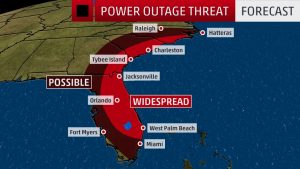 In a press conference on Tuesday morning, October 7th, Florida Governor Rick Scott emphatically stated, “Power saves lives”, in an update on the Hurricane Matthew power outage as the storm scraped the east coast of Florida leaving hundreds of thousands of residents, facilities, and businesses without power.
In a press conference on Tuesday morning, October 7th, Florida Governor Rick Scott emphatically stated, “Power saves lives”, in an update on the Hurricane Matthew power outage as the storm scraped the east coast of Florida leaving hundreds of thousands of residents, facilities, and businesses without power.
Governor Scott made the statement while discussing the extensive effort the utility companies in Florida were making to prepare to get trucks in place and ready to deploy as soon as it was safe to do so. Obviously, Governor Scott is concerned about the well-being of the residents of Florida. But a widespread power outage is much more serious than Floridians going to bed tonight without air conditioning.
Tonight, in the southeast US, over a million residents and businesses will be without power. Widespread power outages can be life-threatening to those in hospitals, shelters, or in need of assistance from emergency responders. The news often talks about “people without power”. But the real concern can be facilities without power. Widespread power outages can be life-threatening to those in hospitals, shelters, or in need of assistance from emergency responders.
Hospitals have patients connected to life-saving medical equipment. First responders need their radio dispatch and communications systems operating properly as they coordinate search and rescue operations. Shelters with thousands of displaced residents need to keep food supplies fresh and emergency lighting operational. ATMs and banking systems need to stay operational so customers have access to cash. Gas stations need to keep their pumps flowing so fuel can be available to power generators.
Natural disasters such as Hurricane Matthew always serve as a reminder of our dependence on power and the importance of having reliable back up power available for critical facilities and businesses. Proper UPS protection with generator back-up should be part of every organization’s power infrastructure. At a minimum, facilities and businesses need to keep their servers, communications systems, and network powered.
The forecast for this weekend in coastal Florida, Georgia, South Carolina, and North Carolina is ominous. For the millions of people in the southeast, we hope their back-up power plan will execute seamlessly and there will be minimal loss of life. For the rest of us, today may be a good day to take a few minutes and review our facility’s back-up power and disaster recovery plan. People’s lives may not depend on whether your business can sustain operations in a power outage, but protecting your IT infrastructure and maintaining access to information is still critical during a disaster.
Here are a few things you can do right now to ensure reliability of your back-up power systems. Walk your building’s power path and perform a visual inspection of the power infrastructure. Look for the following:
- Make sure there is a reliable fuel supply for the building’s back-up generator
- Perform a visual inspection of your switchgear, ATS and electrical room equipment. If you see signs of neglect or wear such as excessive dust or any corrosion, make arrangements for preventive switchgear maintenance
- Check that your facility UPS is online and not in bypass mode or in alarm status. If it is, call for tech support immediately
- Check the health of your UPS batteries. How old are they? Useful life for batteries in UPS applications is 3-5 years. If the batteries are older than that, plan for replacement
- Check the status of the UPS equipment is remote closets or branch offices. Typically, these are supporting critical networking gear
